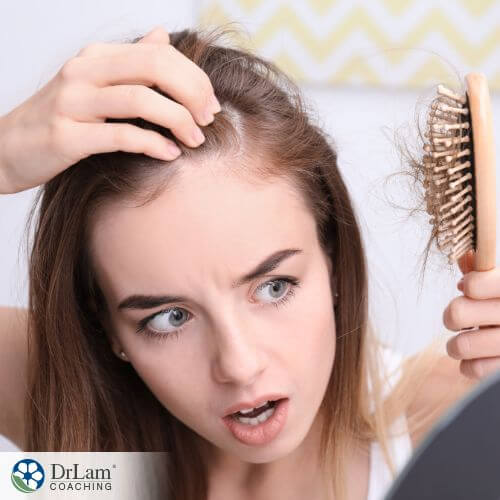 Adrenal fatigue can and often does cause a range of symptoms and problems. Some of them can be frightening and distressing and others can impact your future health. And then there are the symptoms that are just annoying and slightly embarrassing, such as hair loss. Hair loss can occur due to problems within the body’s circuits and the NeuroEndoMetabolic (NEM) stress response. This can make it difficult for you to reverse this troublesome issue. But this doesn’t mean it’s impossible. So, to help everyone out there who’s suffering with the embarrassment of hair loss, let’s answer the question, ‘can hair loss from adrenal fatigue be reversed?’.
Adrenal fatigue can and often does cause a range of symptoms and problems. Some of them can be frightening and distressing and others can impact your future health. And then there are the symptoms that are just annoying and slightly embarrassing, such as hair loss. Hair loss can occur due to problems within the body’s circuits and the NeuroEndoMetabolic (NEM) stress response. This can make it difficult for you to reverse this troublesome issue. But this doesn’t mean it’s impossible. So, to help everyone out there who’s suffering with the embarrassment of hair loss, let’s answer the question, ‘can hair loss from adrenal fatigue be reversed?’.
It’s quite common to experience hair loss when you have adrenal fatigue. This is because adrenal fatigue negatively impacts all of the circuits in the NeuroEndoMetabolic (NEM) stress response.
The stress response helps you to cope with stress. During stressful times, it activates and causes the adrenal glands to produce more cortisol. Cortisol is often called the stress hormone and it changes the way the body’s circuits function in order to help you survive stress and to minimize any damage.
But when the NEM stress response is active over a long period, such as when you experience chronic stress, it becomes unbalanced. The NEM stress response is supposed to be a short-term response to stress, and long-term activation can cause the adrenals to become fatigued because of the high cortisol production. The body’s circuits can also become dysfunctional because they’re forced to remain in the ‘stressed state’ for too long.
This can develop into a condition called Adrenal Fatigue Syndrome (AFS), which can be very dangerous and even fatal if not corrected.
This can cause a whole range of symptoms and problems, including:
The hair loss associated with AFS is often connected to high cortisol levels, problems with hormone levels, and imbalances in the Hormone Circuit.
You may not at first connect your adrenal fatigue with your hair loss. Both of these issues can occur slowly, over time, so it can be difficult to connect them. But the truth is that hair loss is closely connected with adrenal fatigue, so it’s worth looking into whether addressing your adrenal health will positively impact your hairline.
There are several ways that adrenal fatigue may impact hair growth and one of them has to do with cortisol. Cortisol helps to regulate the growth cycle of hair follicles. Here’s how adrenal fatigue can affect this relationship:
So, how do you know if your hair loss is because of telogen effluvium or if there’s another cause? Well, here are some signs of this stress related hair loss condition:
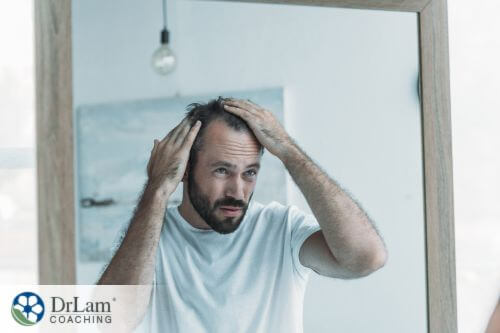 Sudden onset of hair loss after a stressful period
Sudden onset of hair loss after a stressful periodHair loss can also occur with adrenal fatigue because of disfunctions in the Hormone Circuit and the resulting hormonal imbalances.
Hair loss can also occur in adrenal fatigue due to imbalances in the Hormone Circuit. Hair loss is often caused by hormones, and these hormones are mostly secreted and controlled by this circuit. The Hormone Circuit is one of the 6 circuits in the NEM stress response and includes the adrenal glands, the thyroid, and the sex organs. These are the ovaries in women and the testes in men.
The three components of this circuit are interconnected, so as the adrenal glands decline in health and functioning because of AFS, the thyroid and the sex organs do as well. This means not only will you experience health issues that are directly related to the functions of these organs, but you will also experience increasing stress and poor health as the circuit itself declines in health.
Hair loss in adrenal fatigue can occur because of:
Hair loss in adrenal fatigue often occurs due to issues with hormone production and hormone imbalances. These occur as the Hormone Circuit becomes dysfunctional. The 2 main hormones that are directly related to hair growth in both men and women are testosterone and dehydroepiandrosterone (DHEA). Hair loss is a very common symptom when the levels of these hormones are disrupted due to adrenal fatigue and Hormone Circuit dysfunction.
As the Hormone Circuit and the adrenal glands decline in health, the thyroid will become dysfunctional as well. This can result in an underactive thyroid or even a condition known as Hashimoto’s thyroiditis, where your immune system actively attacks thyroid tissue.
The thyroid produces the hormones T3 and T4, which are involved in the development of hair at the root. When these hormones are low or unbalanced, it can cause your hair to fall out and prevent new growth, which will cause hair thinning. This thinning can occur on you head as well as in other places, such as your eyebrows.
When you have hair loss, it’s important that you consider all causes. The best way to combat this issue is to solve the underlying condition, which will encourage more natural hair growth. Some other health conditions associated with hair loss are:
There are also certain medications that are associated with hair loss such as:
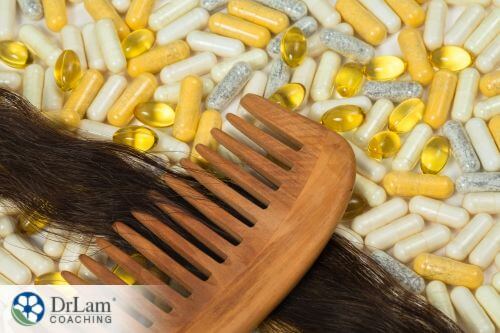 Can hair loss from adrenal fatigue be reversed medically? Well, there are several different conventional therapies that can help with hair growth in some individuals. However, keep in mind that if you don’t address the underlying cause of your hair loss, then you will just continue to lose more hair. You may also experience other uncomfortable symptoms that are associated with the hormone imbalance.
Can hair loss from adrenal fatigue be reversed medically? Well, there are several different conventional therapies that can help with hair growth in some individuals. However, keep in mind that if you don’t address the underlying cause of your hair loss, then you will just continue to lose more hair. You may also experience other uncomfortable symptoms that are associated with the hormone imbalance.
That’s why your first step should be to see a health care practitioner who can help you address the underlying cause of your hair loss. However, if you’ve tried that and it hasn’t helped, then here are some other options:
The answer to the question, ‘can hair loss from adrenal fatigue be reversed naturally?’ isn’t simple. Adrenal fatigue related symptoms are mostly related to hormones, which can be notoriously difficult to balance. However, decreasing your stress levels is a good place to start. This will allow your adrenal glands to rest and recover, which in turn will help to reduce and correct imbalances in the Hormone Circuit. This will encourage your hormones to find a more natural balance, which can encourage better hair growth and less hair loss.
Some ideas to help you reduce your stress levels naturally are:
These lifestyle changes should be made slowly and with respect to your body. Remember that everyone’s body is different, and you are the best judge of your condition and your health. This means that if you feel like something is wrong or getting worse at any time during this process, then you can stop and reassess.
Whether your hair loss is due to adrenal fatigue or other causes, there are practical things you can do that will help promote healthy hair growth. It's important that you adopt these strategies alongside any necessary steps to correct the underlying hormone imbalances, as these will only promote healthy growth, not correct any exist issues.
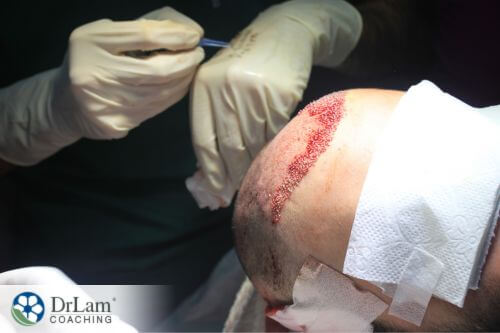 You may also consider taking supplements to help support good general health and hair growth. However, it’s vital that you refrain from taking a ‘scattergun’ approach to supplements as they can be very powerful and cause interactions with other medications, paradoxical reactions, and side effects. They can also be stressful to break down, use, and eliminate if you have adrenal fatigue and your body is already overwhelmed and fragile.
You may also consider taking supplements to help support good general health and hair growth. However, it’s vital that you refrain from taking a ‘scattergun’ approach to supplements as they can be very powerful and cause interactions with other medications, paradoxical reactions, and side effects. They can also be stressful to break down, use, and eliminate if you have adrenal fatigue and your body is already overwhelmed and fragile.
That’s why you need to work with a health care professional who can guide you in your adrenal fatigue recovery journey if you want to take this approach. They will encourage you to first try to get all the nutrients you need from your diet, as this is safer and gentler for your body. Taking supplements should be a last resort in this journey and must be done carefully and with respect for your overall condition and holistic health.
Some supplements that can be helpful for promoting healthy hair growth are:
Can hair loss from adrenal fatigue be reversed? The short answer is yes, but only when you take the right recovery steps and work hard on addressing the underlying adrenal issues as well as the circuit imbalance that’s causing the problem. If you’re ready to start on this journey to having healthy hair growth again, then here’s how to get started:
For more help with hair loss and other issues related to adrenal fatigue, talk to our team on +1 (626) 571-1234 or click here.
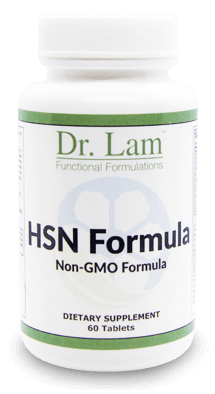
Unlock the secret to luscious locks
Allen, Loyd V, ‘Adrenal Fatigue’, International Journal of Pharmaceutical Compounding, vol. 17, no. 1, 2013, pp. 39-44.
Eun Young Lee, You Jin Nam, Sangjin Kang, et al., ‘The local hypothalamic-pituitary-adrenal axis in cultured human dermal papilla cells’, BMC Mol Cell Biol, vol. 21, no. 1, 2020, pp. 42.
Head, Kathleen A, & Kelly, Gregory, S, ‘Nutrients and botanicals for treatment of stress: adrenal fatigue, neurotransmitter imbalance, anxiety, and restless sleep’, Alternative Medical Review, vol. 14, no. 2, 2009, pp. 114-40.
There is no short answer to the question, can hair loss from adrenal fatigue be reversed. It all depends on your body and its condition as well as the recovery steps that you take. However, you can increase the odds of reversing this condition with some simple steps.